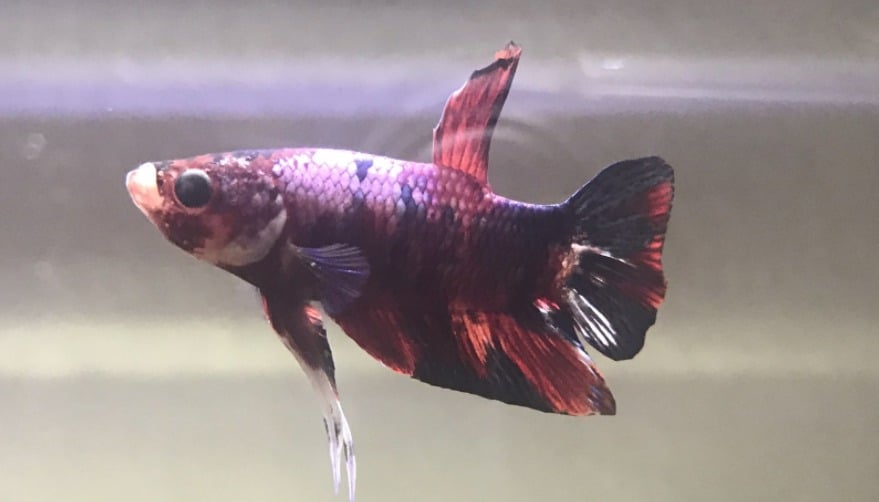Your betta is so beautiful. You take care of him well, keep his tank clean, and feed him often. But one day you notice he has cloudy eyes. What could be wrong? Are his eyes infected? Do you need to get your fish a doctor? Is there anything that can help clear up the cloudiness in his eye? This article will discuss how to treat cloudy eyes in bettas and what might cause this condition.
Why Does My Betta Have Cloudy Eyes?
There are many reasons why a betta might develop cloudy eyes. The most common causes are:
1. Internal Parasites
These are tiny organisms that live inside your fish and can cause inflammation and other health problems. This usually happens in the wild, but the parasites can make their way into indoor aquariums.
You can never be too careful when it comes to your precious aquarium. Make sure you always wash anything new with an antibacterial and antiparasitic solution when adding new plants or fish.
You can solve this issue by using a fish tank-safe anti-parasitic to treat your betta and the entire aquarium. Your local pet store will sell you something that works well for this type of thing.
2. Bacterial infection
A bacterial infection can cause the eyes to become cloudy and inflamed. This is a serious condition that requires immediate treatment. It usually happens due to the eye becoming injured and then being exposed to bacteria.
If you notice your betta’s eyes have turned cloudy and he is acting lethargic or not eating, it’s possible he has a bacterial infection. Put your betta into a quarantine tank and treat him with antibiotics immediately.
3. Cataracts
Cataracts are a clouding of the normally clear lens inside your betta’s eye. It makes it harder for him to see and can make his eyes look cloudy or opaque (even though there is no infection). This condition most commonly affects older fish, but any betta can get cataracts at any time during their life cycle.
Cataracts can make your betta more prone to infections and other health problems. If left untreated, they will only worsen over time as they continue clouding up the eye. If you have cataracts in one of his eyes, it’s best that he not be kept with any other fish.
4. Nutritional Deficiency
Bettas need a balanced diet to stay healthy. If they are not getting the proper nutrients, they can develop cloudy eyes as a result.
As such, it’s important to feed your betta a healthy, balanced diet. Avoid overfeeding him and always make sure you are using the proper food for his life cycle stage.
I feed my betta with high-protein pellets, flakes, and occasional food like bloodworms. This gives him all the nutrients he needs to stay healthy and keep his eyes from turning cloudy.
5. Poor Water Quality
Your betta’s eyes are an important part of his body. They serve to help him breathe and see, they protect the delicate tissues within his skull from injury, and they contain a lot of sensitive cells that can get damaged if he isn’t kept in clean water with proper filtration.
The solution is to keep your aquarium clean. You should perform a partial water change every other week, and do a deeper cleaning of the tank once in a while as well.
It’s also a good idea to frequently test the water’s pH level to make sure that it stays around 6.8. This is an ideal pH level for your betta’s health.
Symptoms of Cloudy Eye in Betta Fish
If you are not sure whether or not your betta has cloudy eyes, there are a few things you can look for. The most common symptoms of cloudy eyes in bettas include:
- Inability to see properly
- Gray film over the eye
- Mucus on the eye or around
- Pupils that are dilated (enlarged)
- Sensitivity to light
- Redness and inflammation around the eyes
These symptoms will likely cause stress for your betta and can lead to other health problems if left untreated. As such, your betta can become lethargic and stop eating, and he may eventually die.
If your betta is exhibiting any of these symptoms, it’s best to take him to a vet for an examination. Only a professional will be able to tell you for sure what is causing the cloudy eyes and how to treat them.
Is Betta’s Cloudy Eye Contagious?
No, it is not contagious. Cloudy eyes in bettas are usually caused by a number of different things, such as aging, cataracts, infection, or nutritional deficiency. It is not something that can be passed from one fish to another.
However, the exact cause of the cloudy eyes is important, as environmental causes will also affect any other fish in your tank. For example, if the water quality is poor, then all of your fish will be at risk.
How to Prevent Cloudy Eyes in Betta Fish?
There are a number of things you can do to prevent your betta from developing cloudy eyes, such as:
- Test the quality of water every one or two weeks. You should aim for zero ammonia and less than 20ppm nitrates. Change part of the water every two weeks to keep it fresh.
- Clean all decorations and the inside walls of the tank to remove any algae
- Us the best filter system to ensure your betta gets the best oxygen supply. Clean this filter and replace the cartridges to keep it running efficiently
- Keep your betta in a tank of at least 10 gallons to give him plenty of space
- Feed a balanced diet that includes high-quality protein pellets, flakes, and occasional live food
- Limit stress by providing a calm environment and avoiding overcrowding
Conclusion
In conclusion, bettas can develop cloudy eyes for a number of reasons. Nutritional deficiencies, poor water quality, and stress are the most common causes. Luckily, bettas are very hardy fish and they can survive quite a while with cloudy eyes.
If you do notice that your betta’s eyes are starting to get cloudy, it is important to act fast by following the above advice. Most cases of a cloudy eye in bettas are environmental and can be prevented with some simple steps, but you may want to contact a vet if the problem persists.






